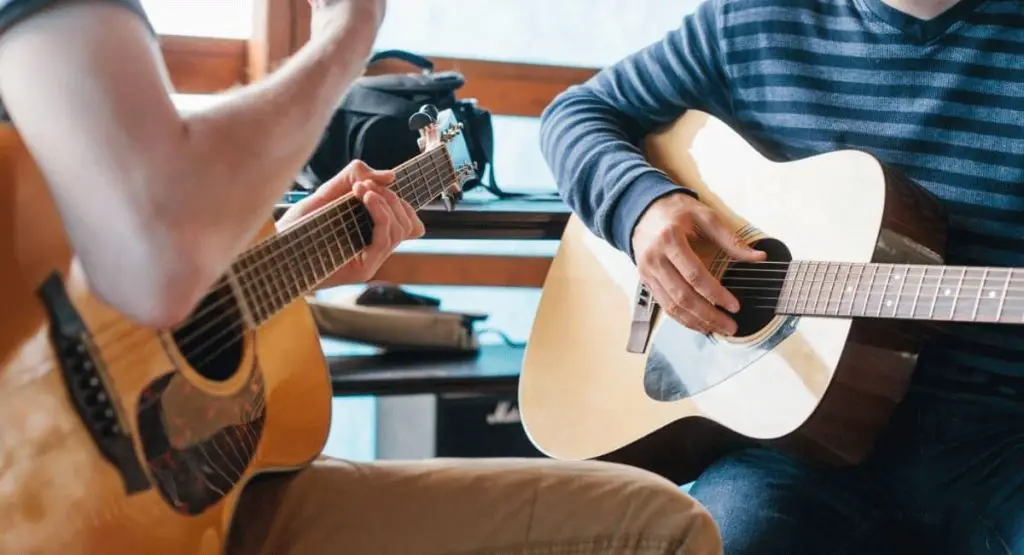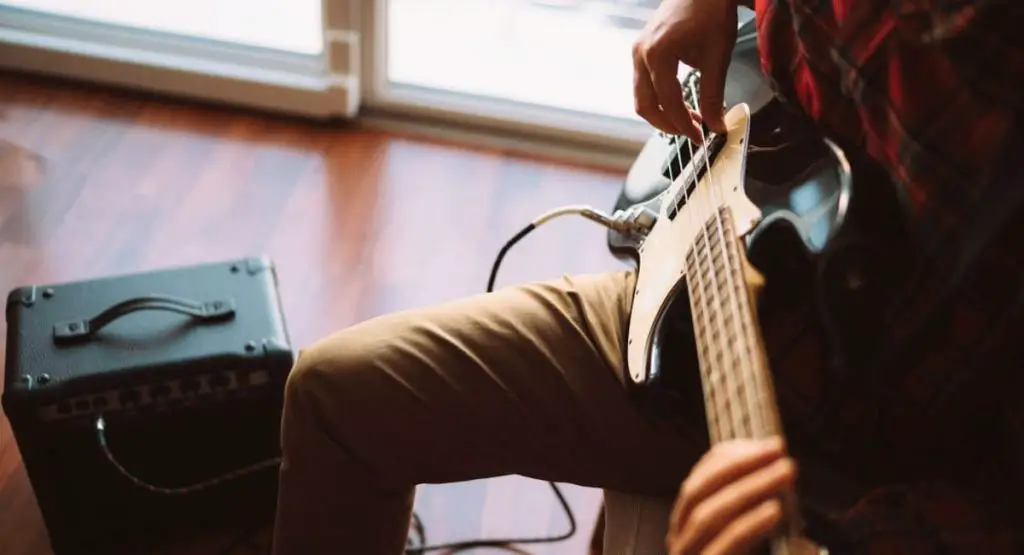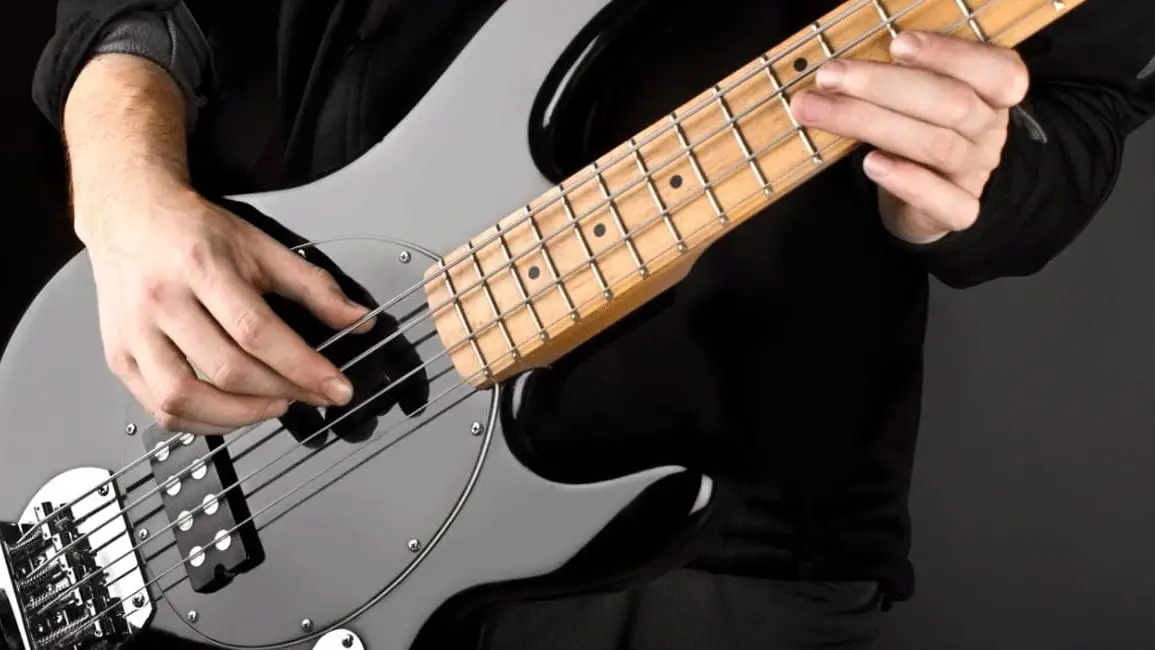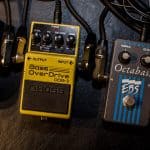When it comes to learning a bass guitar, there is no specific time frame. For any skill worth learning, it would take an amateur considerable time to become comfortable and even longer than that to master it. The same can be said for a musical instrument like the bass guitar.
The time it takes to learn to play the bass guitar and how fast depends on various factors.
The bass guitar is a unique musical instrument, and in this post, we will explain how long does it take to learn the bass guitar and give you specific advice on how you can play faster.
What is a Bass Guitar
The bass guitar, also known as electric guitar, is a stringed instrument built as a mirror image of the regular electric guitar. The traditional bass guitar comes in two variants, a solid body electric guitar, and a hollow-bodied acoustic guitar
The bass is the powerhouse of all musical instruments used in a band, establishing the beat and harmonic framework with the other musical instruments. There are different bass guitars based on their guitar string and body type.
Learning a Bass Guitar: Factors To Consider

Learning to play the bass guitar can depend on many factors, including the following:
Musical Experience/Background
People with previous musical experience can pick up lessons on the bass guitar faster than ordinary people with no musical background because they have a basic knowledge of music and are familiar with music theory. There is a vast difference between a regular and a bass guitar, so you can’t assume that it will be easy just because of your musical experience.
Age of Student
For most musical instruments, younger people tend to pick them up faster than adults. It doesn’t mean adults can’t learn the instrument, but it may require more work and patience.
Studies have shown that learning or even playing a musical instrument helps with cognitive activities and jeeps age-related diseases like dementia or Alzheimer’s away.
Aptitude
Some people are naturally gifted with musical talent, whether it’s about reading music or playing certain instruments. For them, learning how to play music is very easy. The same thing applies to learning bass guitars.
Musically inclined individuals pick up musical skills very quickly, and they have a good ear for notes. Being musically gifted may or may not make it easier to master the bass quickly. It would still require dedication and continuous practice to perfect it.
Dedication To Learning
Your dedication to learning is, for the most part, the only thing that can determine how fast you learn. The saying practice makes perfect is applicable in this context.
Having a serious practice session for one hour daily as opposed to an unserious one for three hours will go a long way.
Whether you are taking lessons from a bass guitar teacher, online, or by yourself, you have to possess the utmost level of dedication to your learning process.
Objectives/Goals
People have different reasons why they want to learn the bass, but this cannot be done within 1-4 weeks. Some individuals learn to become famous and tour the world, while others just want to be able to play some of their favorite songs.
Your goals will determine the time frame of your learning process. If you want to be a pro bassist, free up the next 10 to 15 years of your life for three hours per day. But if you’re going to play some songs you love, it shouldn’t take you more than a year to achieve that.
Levels Of Learning Bass Guitar
There are three major levels involved in learning a bass guitar:
Beginner Level
At this stage, you’ll learn how to hold the guitar comfortably so that it won’t injure your wrist. You’ll learn to use a guitar pick and figure out if you’re comfortable with it or not. You’ll learn to read single notes on the fretboard and practice some finger exercises. At the beginner level, it takes about six months to a year to become comfortable with the bass guitar
Intermediate Level
As an intermediate bass guitar player, you should know more about the guitar. At this stage, you’ll learn about musical theories like modes & triads.
You will be able to distinguish between notes and discern which notes are compatible with each other, so you can improvise on stage while playing with other musicians using different keys.
Intermediate-level learning takes about one year to three years of consistent practice.
Advanced level
Advanced guitarists or advanced players can pick up any guitar and play any song in any key comfortably. Their improvisation technique at this point is very top-notch.
For the average person, with a good amount of practice, it takes around ten years to get to this level of expertise. For musically gifted people, it takes them just a few years to get here.
What Do You Need to Learn?

As you move through the stages of learning (beginner-intermediate-advanced), there are a couple of things you’ll need to familiarize yourself with and practice:
Fretboard Notes
This is the first thing you have to learn as a beginner. You have to know the differences between notes, where they are, and what they are. This is the basis of playing bass, and it is a vital part of learning to play the bass guitar.
There are 20-something frets on the fretboard. As you continue to learn over time, it becomes easier to move to them effortlessly and fluidly practice.
The Scales
Once you understand where to find the notes, the next logical step is to learn about the scales. These are harmonically compatible notes. The first scales you’ll learn are the major, minor and pentatonic scales.
Learning which scenes are compatible harmonically helps with improvised playing while staying in key. Once you’ve understood the shape of every scale, you can apply it to the fretboard.
Guidelines To learn The Bass Guitar
Using the guidelines below, you should become more comfortable playing and improve considerably.
Make Sure You Use The Fifths & Octave
The fifth and octave are the most harmonically compatible notes you can play as a bassist. Some of the most popular bass guitar classics and lines were composed using fifth, octave, and root as the mainframe.
Using this technique allows you to create a melodic and fascinating bassline. It meshes with the drums and doesn’t class harmonically with basic chords.
Take Online Bass Guitar Lessons
There are numerous platforms online that offer training in bass guitar. Even though they might have different learning and teaching methods, they are affordable, and you can learn at your own pace.
As a beginner, you should look for websites that take their courses in a coordinated and straightforward manner, just like Jamplay.com.
Take a Private Lesson
A traditional way of learning any musical instrument is by taking private lessons. These classes are costly, so they require commitment from the bass guitar teacher and the student
Taking a private lesson gives you the luxury of getting a response when you make a mistake. In this case, your bass instructor can correct your errors immediately and guide you properly.
As a beginner, you should take advantage of the many free resources available online. You can opt for private lessons when you need specific assistance with your technique.
Play Along With Your Favourite Artists
This is probably the most effective way to learn a bass guitar. While online lessons will take you far in learning the basics and techniques, listening to your favorite bass players or even watching them play can help you improve your playing time.
Learn From a Mentor/Tutor
One way to learn bass guitar is to learn from an expert. For people aspiring to be bassists, whether as a beginner or with a musical background, having a mentor will help immensely.
Being expensive, learning bass guitar from a mentor requires your utmost dedication to the process. The more you learn and practice, the better you become.
Mentors criticize you and your skills often, but they give you specific and reliable tips on how to improve. Regardless of your mode of learning, having a mentor is beneficial.
Conclusion
Learning a musical instrument can be difficult or easy, depending on each individual. Whether you are an amateur or a regular guitar player, you may still encounter some challenges, but with a great sense of rhythm and knowledge of basic music theory, you can cross any hurdle.
We hope this guide helped you understand how long does it take to learn bass guitar. Use the tips given above and try to have fun throughout your learning process!



